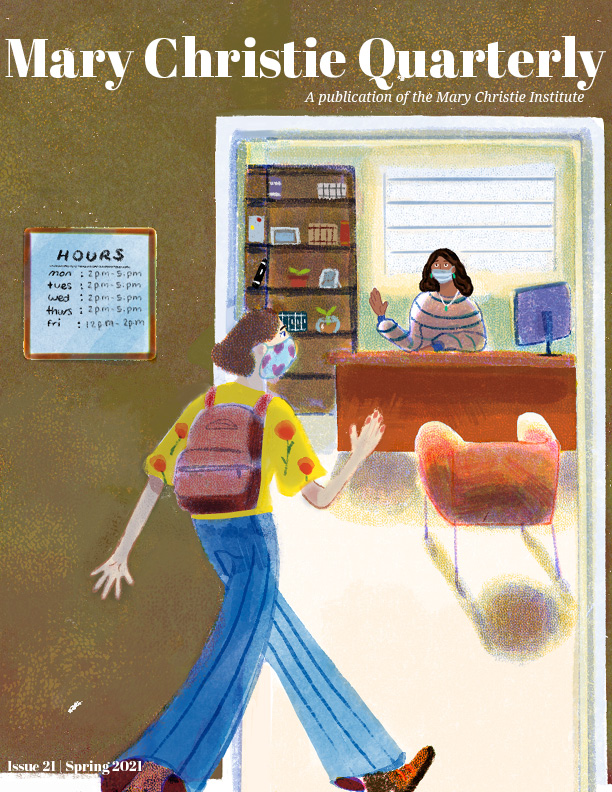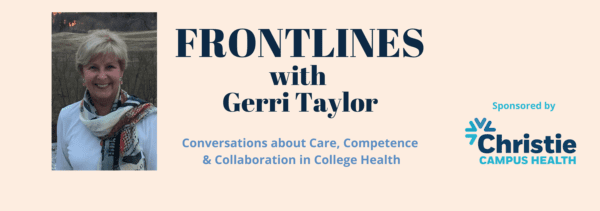
Artist: RaShawn Dixon
In “Faculty’s Response to Student Mental Health,” the Boston University School of Public Health, the Healthy Minds Network, and the Mary Christie Foundation found that nearly 80% of higher education faculty report having dealt with student mental health issues over the past 12 months and nearly 90% believe student mental health has worsened since COVID-19.
The findings challenge an assumption in higher education that faculty do not see the mental health and wellbeing of their students as “their job.” To the contrary, the data (from nearly 1,700 college and university professors across the country) indicate faculty are highly engaged in student mental health, which should cause administrators to question how well faculty are supported in their role. According to the survey, there is enormous opportunity for improvement.
Three quarters of faculty surveyed said they are likely to reach out if a student is in distress, but only half have a good idea of how to recognize this. Faculty are even less confident recognizing signs of and having conversations about substance misuse. Most have not participated in gatekeeper training, but those who have participated in training have found it helpful. In fact, nearly 70 percent of faculty are motivated to strengthen their role in supporting student mental health and over 60 percent believe it should be mandatory that all faculty receive basic training in how to respond to students experiencing mental or emotional distress.
In addition to gatekeeper training, faculty who participated in the study said they would like a list of available mental health resources, a checklist of warning signs of mental and emotional distress, guides for how to initiate conversations about mental health, and written mental health statements to include in their syllabi.
The findings challenge an assumption in higher education that faculty do not see the mental health and wellbeing of their students as “their job.”
With limited counseling hours and high demand for services, colleges and universities are increasingly looking to all campus stakeholders, particularly faculty, to be “eyes and ears” on students in distress, as well as to promote mental health and wellbeing in their interactions with students. But in doing so, institutions must provide more support for faculty if they are to continue to rely on their judgement. The expectation is not for faculty to become clinicians, but for them to work in partnership with counseling staff and student affairs professionals.
There are other dynamics at play here beyond simply keeping students safe. Faculty play an enormous role in shaping student success. Data show that having a personal connection with a faculty member equates to higher student satisfaction and sense of belonging. Furthermore, not everything negatively affecting students is a mental health issue requiring an intervention by a licensed counselor. Sometimes students need someone to talk to, or someone to ask how they are doing, and faculty can be enormously helpful in this regard. But not all faculty have the confidence or the inclination to be a concerned listener. Without encouragement or approval from leadership – both the president’s office and their department heads – faculty are left on their own, often second-guessing their actions. Instead, leaders should recognize and reward faculty for these efforts much as they do with publishing.
The survey also reminds us that faculty are human beings with their own struggles and competing priorities. One in five professors in the survey agreed that supporting students in distress has negatively impacted their own mental health. About half of faculty reported having at least one symptom of depression. The report also found that large numbers of Latinx and Black faculty find their campus climates to be unwelcoming to students of color. This creates an added burden for these faculty members if they do not trust the institutions to which they are referring their students.
How involved faculty ought to be in student mental health is an ongoing question. But as this survey shows, faculty are already involved to large degrees in their students’ mental health and wellbeing, accelerated perhaps by the pandemic. Colleges and universities should see this as an opportunity to embrace faculty’s willingness to help and provide them with the support and direction they’ve said they need. Empowering this critical yet under-tapped resource will save lives.
Sarah Ketchen Lipson, Ph.D., Ed.M., is an assistant professor at the Boston University School of Public Health. She is also co-Principal Investigator of the national Healthy Minds Study, an annual survey of undergraduate and graduate student mental health and related factors.
Zoe Ragouzeos, Ph.D., is Executive Director of Counseling and Wellness Services at New York University and is President of the Mary Christie Foundation.
This article was previously posted in Commonwealth Magazine.



